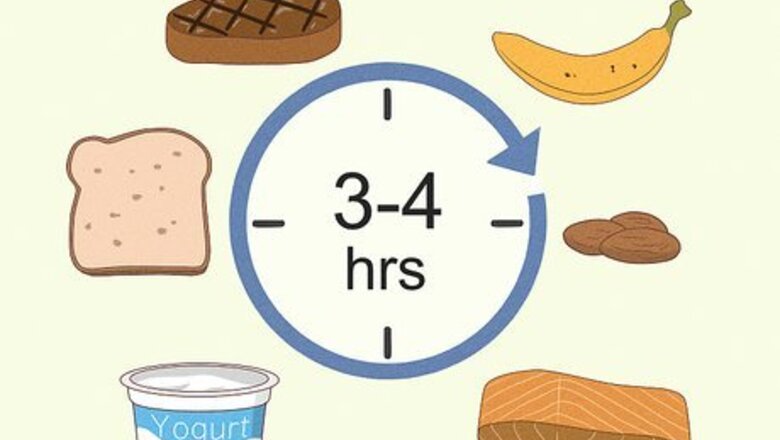
views
Here are 12 effective ways to keep weight off and maintain a thin figure.
Eat regular meals when you feel hungry.
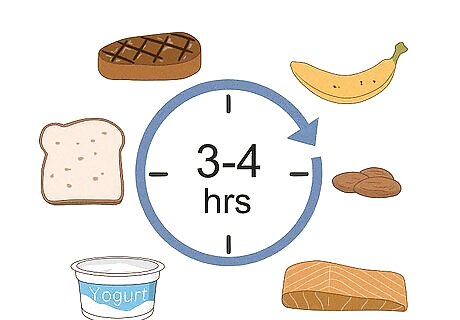
Enjoy nutritious meals or snacks instead of skipping meals. Pay attention to your body's cues and eat when you're hungry. While eating smaller more frequent meals won't boost your metabolism, it will stop you from getting too hungry and overeating when you do sit down to eat. Plan on eating a meal or healthy snack every 3 or 4 hours. You'll make more nutritious choices if you don't wait until you're absolutely starving to eat. Start your day with a nutritious breakfast instead of skipping it. Try Greek yogurt or eggs with fruit and a piece of whole-grain toast, for instance.
Savor your food and stop eating as soon as you feel full.

Chew your food slowly and enjoy every bite. When you eat slowly, it gives your body time to send a signal to your brain that it's full and you can stop eating. Give yourself at least 15 to 20 minutes to eat a meal so you don't eat too quickly. Once you feel full, stop eating! You've probably experienced this before—you're really hungry, so you eat as fast as possible. You most likely ate a lot of food and then felt really full. Eating slowly can prevent this from happening in the future. It takes about 15-20 minutes for the hunger center in your brain to process the signal that you’re full. Eating slowly or taking a break in the middle of your meal can give your stomach and brain time to catch up so that you don’t overeat.
Eat lean protein and lots of produce every day.

You'll get energy from the protein and tons of nutrients from fruits and veggies. These are also great low-calorie options compared to carbohydrates like pasta and bread. Eating protein at each meal will curb your appetite, while fruits and vegetables are full of vitamins that your body needs. Great low-calorie options include: Turkey, chicken, salmon, and eggs Plant-based alternatives like tofu and soy Low-fat dairy like yogurt or milk Leafy greens like spinach, arugula, and kale Strawberries, bananas, oranges, pineapple, and grapes Carrots, tomatoes, squash, bell peppers, broccoli, and asparagus
Cut back on saturated fats, sugar, and processed food.
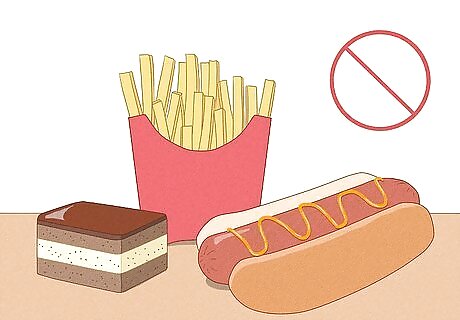
Limit the unhealthy fats that you eat every day to prevent weight gain. It's true that some fat, like polyunsaturated fat, is good for you. But unhealthy fats, like saturated or trans fats, are often found in high-calorie foods. Eating these every day can make it harder to stay thin. To keep the weight off, avoid foods like: Doughnuts, cookies, crackers, muffins, pies, and cakes Red meats, deli meats, butter, and full-fat cheese Fried foods and fast food
Skip high-calorie beverages.

Sugary beverages and alcohol are high in calories, so take them out of your diet. It's easy to sip on soda or juice throughout the day, but they're full of calories that add up fast. Cutting out just 1 soda or sports drink a day can save you 150 calories! Stick with water and sugar-free beverages for an easy way to make a big change in your diet. Unsweetened green tea is a great choice— some studies show that it may increase fat-burning and weight loss.
Serve meals on smaller plates to control your portion sizes.
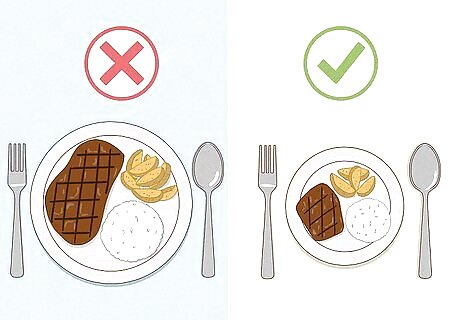
The smaller plates make it easier to eat less in each sitting. Swap out your big 11 in (28 cm) dinner plate for a 9 in (23 cm) lunch or salad plate so you fill it with fewer calories. Enjoy the food that's on your plate and don’t go back for seconds. Serving sizes in restaurants are usually huge! If you're eating out, order appetizers instead or share an entree with a friend. Don't set out platters or bowls of food on the table since it's easy to graze or keep filling your plate.
Move your body as often as possible.
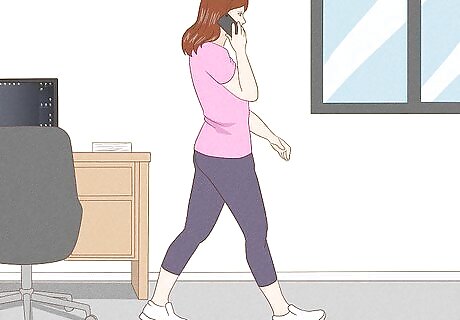
Look for opportunities to get up so you're not sitting for a long period of time. Think about how long you sit throughout the day—when you're working at a desk, commuting to work, or using a computer, for instance. Try to stand up and move every 30 minutes to burn calories. All these little movement breaks add up! If you usually sit at a desk, switch to a standing desk. You can also get up and walk around when you're talking on the phone or even watching television. Take your meetings on a walk. Instead of sitting around an office table, plan to walk and talk.
Do exercises during downtime.
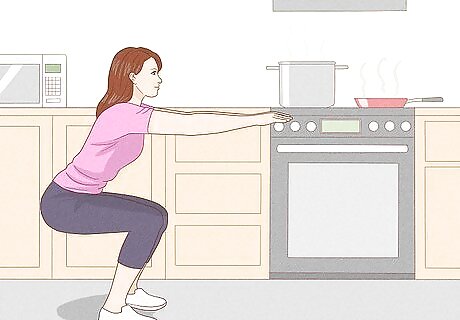
Add a few quick exercises whenever you have a few minutes to spare. Don't have time to work out at the gym? You can increase your activity level without leaving your home! Consider all the times when you're waiting for things and do simple exercises when you can. Even a few minutes of physical activity here and there can help keep the weight off. For example, if you're waiting for dinner to finish cooking, do a few squats or planks. Watching tv or listening to a podcast? Get up and do some jumping jacks or crunches.
Aim for 30 minutes of daily physical activity.
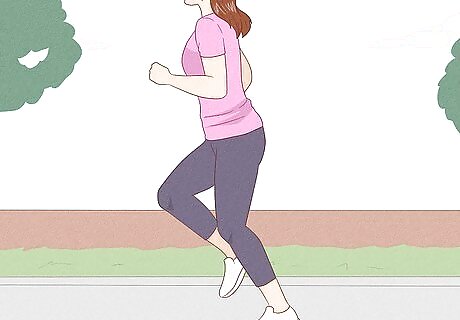
Regular exercise can keep the weight off. The good news is that you don't need extreme physical activities to help you stay in shape. Exercises like walking or swimming are great ways to stay active. If you can't do 30 minutes in a single stretch, do what you can—a few short jogs or a couple of strength training sessions are great, too. If you can, mix up the types of physical activity you do. You'll be less likely to get bored with it and you'll burn calories in different ways so you're working a variety of muscles.
Get 7 to 9 hours of sleep every night.
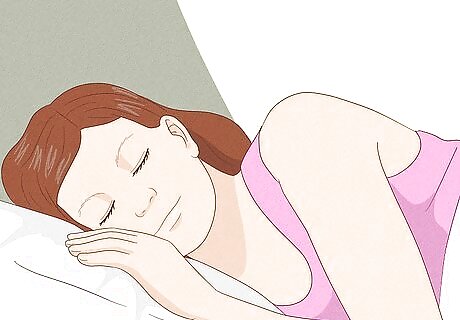
You'll feel more rested and have more energy for physical activity. Studies have shown that not getting enough sleep can lead to weight gain. It may also disrupt hormones that control your appetite and hunger, so you eat more. To keep your metabolism in check, try to get 7 to 9 hours of sleep every night. Skip snacks before bed and try to stop eating after your last meal of the day.
Do stress-reducing activities every day.

You're more likely to eat when you're stressed, so try coping activities instead. Research shows that stress or anxiety can lower your energy levels so you feel less active. It can also negatively impact your metabolism. Instead of eating when you're stressed, you might try: Learning meditation and mindfulness techniques Practicing breathing techniques Doing gentle stretching or practicing yoga Getting regular massages Learning a new sport or hobby
Develop a body-positive mindset.
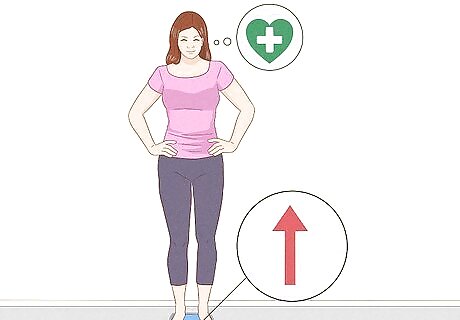
Turn negative thoughts about your weight into body-positive reminders. It's easy to fall into the trap of obsessing over your weight. This can lead to eating disorders, low self-esteem, and depression. Instead of spending time on these thoughts, stop yourself and take a moment to focus on something you like about yourself. For example, stop yourself from worrying about how much you weigh. Think to yourself, "I'm grateful I have a healthy body and I'm just the right size for me!"



















Comments
0 comment